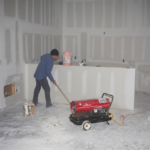Trial Court’s Finding as to Worker’s Cause of Death Was Reasonable

A worker died while troweling a newly poured concrete floor in an enclosed building. At the time, a gas heater warming the space wasn’t properly vented and a gas line to it was electrified. His employer was convicted of a safety violation and fined $12,000. He appealed. Although the pathologist who performed the autopsy found that the worker died from electrocution, evidence was presented that he might have died of carbon monoxide poisoning. The trial court rejected this evidence. But an appeals court ordered a new trial, concluding that the evidence supported a reasonable inference that carbon monoxide poisoning could also have caused the worker’s death. The Crown appealed this decision and the Court of Appeal agreed with it, restoring the conviction. The appeals court improperly interfered with the trial judge’s reasonable finding that the worker couldn’t have died from carbon monoxide poisoning [R v. Farnham, [2016] SKCA 111 (CanLII), Aug. 30, 2016].